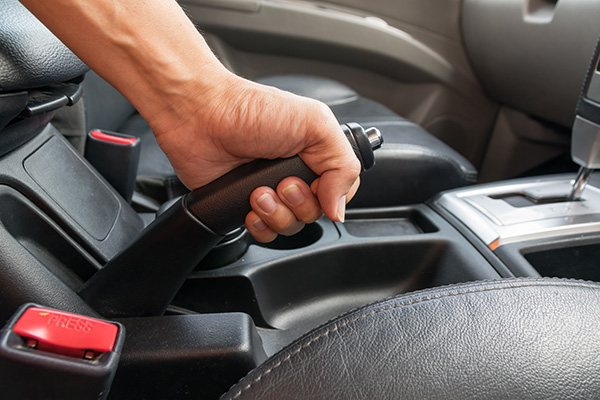
You engage the parking brake, shift into gear, and instead of staying put, the car inches forward. It’s a small movement, but enough to make you question whether the brake is doing its job. The parking brake is designed to hold your vehicle in place—if it doesn’t, there’s likely a problem. This kind of issue tends to show up in older cars or ones that haven’t had the brake system serviced in a while. Knowing what’s causing it can help you avoid more serious (and expensive) trouble down the line.
How the Parking Brake Is Supposed to Work
The parking brake is a separate system from your regular hydraulic brakes. It’s usually cable-operated (in traditional setups) or electronic in newer vehicles, and it engages the rear brakes to prevent your car from rolling when parked.
When you pull the lever or press the brake button, the system tightens those rear brakes mechanically. It’s not designed to stop your car while moving but to hold it in place once it’s stopped.
So, if your car moves even slightly after setting the brake, it means the system isn’t applying enough force to keep the wheels locked. That’s a problem—especially if you’re parking on hills or uneven ground.
Worn Brake Components Reduce Holding Power
Over time, the parts that make up the parking brake system wear down. If you have rear drum brakes, the shoes inside can thin out, or the brake drums may become worn and glazed. In disc brake systems with a parking brake, the calipers or internal drum components inside the rotor can wear out too.
When this happens, even if the cable is pulling correctly, the contact between the brake components is too weak to hold the car in place. The result? A car that can still roll, even though the handbrake is “on.”
If you’ve noticed the handbrake pulling higher than usual or needing more effort to engage, this kind of wear is likely the cause.
Stretched or Damaged Parking Brake Cable
For vehicles with manual or lever-style handbrakes, a stretched or frayed cable is another common cause. The more you use the handbrake, the more tension the cable loses over time.
When that cable becomes too loose, pulling the lever doesn’t apply enough force to the rear brakes. In some cases, the cable can start sticking or catching, especially if dirt or corrosion gets inside the sheath.
This is particularly common in areas like Corpus Christi, TX, where coastal moisture and salty air cause rust to build up on undercarriage components faster than in drier climates.
Misadjusted or Poorly Maintained Systems
Even if nothing is broken or worn out, a parking brake that hasn’t been adjusted in a while can still cause problems. Brake components settle over time, and unless they’re periodically checked and adjusted, the system loses its ability to clamp down fully.
This is why regular brake inspections are important—even if your car seems to stop fine with the pedal. Your parking brake is a separate system, and it needs attention too.
For electronic parking brakes, software or sensor issues can also interfere with proper engagement. If you hear the motor running but the car still moves, it could be a calibration issue or a fault in the control module.
When It’s Just a Little Movement—And When It’s Not
It’s important to know that a slight amount of movement—like an inch or two of roll—isn’t cause for panic, especially in automatic cars where the weight of the vehicle settles into gear after braking. But if your car continues to roll or feels like it’s not being held at all, that’s when you know the parking brake isn’t doing its job.
This is especially dangerous on inclines or in manual transmission vehicles, where the parking brake plays a bigger role in holding the car steady.
Don’t rely on gear alone to stop your vehicle. If your brake isn’t holding as it should, it’s time to get it looked at.
Don’t risk a parking mishap—stop by Pro Drive in Corpus Christi, TX for expert brake diagnostics and fast repairs you can trust.